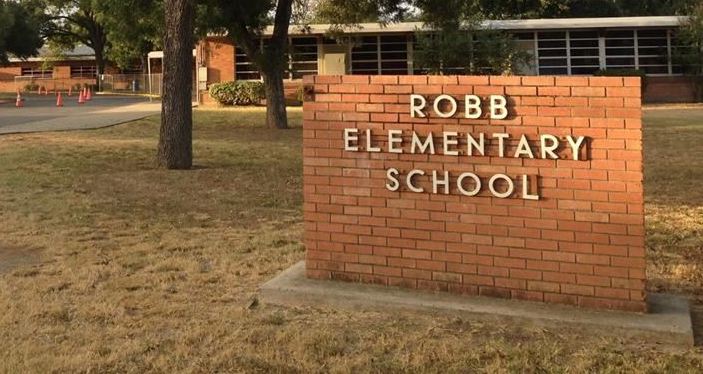Students, faculty gather to honor victims of recent Texas shooting

For medical science masters student Amber Nguyen, a lack of immediate action taken by USF to provide psychological support to students and faculty following the mass shooting at Robb Elementary School was a source of frustration.
The shooting occurred May 24 around 11:30 a.m. In a little less than an hour, the 18-year-old perpetrator shot into classrooms with an assault rifle that resulted in the deaths of two teachers and 19 students.
Rather than being dissuaded by her anger toward the university, conversations about the shooting with those around her inspired Nguyen to take action. Alongside various university departments, including the USF Psychology Center and University Police (UP), she said she organized Friday’s candlelight vigil to provide attendees a safe space to share their feelings about the attack.
“Especially being a college student, especially with my friends having their own kids and being teachers, I did not want to let these lives be forgotten. I felt like I had to take the initiative to do this vigil,” Nguyen said. “It wasn’t only an opportunity to remember and honor these kids and teachers who lost their lives, but to also educate and inform [attendees] on mental health and gun safety.”
About 15 students and faculty members gathered at USF Health at 4 p.m. to partake in the hourlong vigil, with the majority of participants attending in person.
Attendees watched Nguyen present individual slides of testimonies from the families of the 21 victims with the supervision of USF Counseling Center Diversity Initiatives Coordinator Dani Rosenkrantz, who assured the audience she was available to provide psychological support to anyone experiencing emotional distress. UP was also present to provide support to attendees with a therapy dog.
Rozenkratz’s address to participants outlined support groups offered by the Counseling Center for students and faculty seeking psychological services. During the sessions, she said, prospective attendees would be provided a variety of methods for developing coping mechanisms, such as meditation workshops and group conversations.
Professor and Director of the College of Public Health’s Activist Lab Karen Liller addressed attendees with a statement condemning the shooting. Given her research in public health and safety advocacy for children, Liller said although she is saddened by the tragic news, she is not surprised by the recurring gun violence given the lack of safety measures provided within current gun laws.
“This shooting is very much reminiscent of the tragedy at Sandy Hook Elementary nearly 10 years ago and the many more tragedies that have occurred since,” she said. “We know that common sense gun laws work. The majority of Americans support these laws and [evidence shows that] overall, states with stronger firearm laws have less gun violence. Will they solve everything? No, but it is a direction we need to step in and must take.”
Nguyen and public health masters student Madison Sanders invited students to discuss their feelings over the shooting in a roundtable session. The pair offered a variety of talking points to spark conversation among attendees, such as discussing coping mechanisms they have used to process their emotions over the attack.
The overarching theme of each of the conversations, however, was envisioning ways to prevent similar tragedies from occurring in the future. A common solution shared by many of the speakers was that rather than relying upon policymakers to create change, participants should reach out to their local, state and federal representatives to advocate for stricter gun safety legislation.
Continuing to hold conversations on gun safety measures will be essential for preventing future occurrences of gun violence, according to Sanders. Showing support for gun safety organizations, such as March for Our Lives and Moms Demand Action, is an action she said could result in the implementation of safety education in the future.
“I think this vigil was a great first start … I do think following our conversations, we need to stress the idea that it is vital to vote to be an advocate for gun safety and importantly, we need to keep talking about it,” she said.
“It’s something USF should talk about not only today, but tomorrow, two days from now, the next year and beyond that.”







